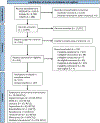Hormonal Treatments and Vaginal Moisturizers for Genitourinary Syndrome of Menopause : A Systematic Review
- PMID: 39250810
- PMCID: PMC12333043
- DOI: 10.7326/ANNALS-24-00610
Hormonal Treatments and Vaginal Moisturizers for Genitourinary Syndrome of Menopause : A Systematic Review
Abstract
Background: Postmenopausal women commonly experience vulvovaginal, urinary, and sexual symptoms associated with genitourinary syndrome of menopause (GSM).
Purpose: To evaluate effectiveness and harms of vaginal estrogen, nonestrogen hormone therapies, and vaginal moisturizers for treatment of GSM symptoms.
Data sources: Medline, Embase, and CINAHL through 11 December 2023.
Study selection: Randomized controlled trials (RCTs) of at least 8 weeks' duration enrolling postmenopausal women with at least 1 GSM symptom and reporting effectiveness or harms of hormonal interventions or vaginal moisturizers.
Data extraction: Risk of bias and data extraction were performed by one reviewer and verified by a second reviewer. Certainty of evidence (COE) was assessed by one reviewer and verified by consensus.
Data synthesis: From 11 993 citations, 46 RCTs evaluating vaginal estrogen (k = 22), nonestrogen hormones (k = 16), vaginal moisturizers (k = 4), or multiple interventions (k = 4) were identified. Variation in populations, interventions, comparators, and outcomes precluded meta-analysis. Compared with placebo or no treatment, vaginal estrogen may improve vulvovaginal dryness, dyspareunia, most bothersome symptom, and treatment satisfaction. Compared with placebo, vaginal dehydroepiandrosterone (DHEA) may improve dryness, dyspareunia, and distress, bother, or interference from genitourinary symptoms; oral ospemifene may improve dryness, dyspareunia, and treatment satisfaction; and vaginal moisturizers may improve dryness (all low COE). Vaginal testosterone, systemic DHEA, vaginal oxytocin, and oral raloxifene or bazedoxifene may provide no benefit (low COE) or had uncertain effects (very low COE). Although studies did not report frequent serious harms, reporting was limited by short-duration studies that were insufficiently powered to evaluate infrequent serious harms.
Limitations: Most studies were 12 weeks or less in duration and used heterogeneous GSM diagnostic criteria and outcome measures. Few studies enrolled women with a history of cancer.
Conclusion: Vaginal estrogen, vaginal DHEA, oral ospemifene, and vaginal moisturizers may improve some GSM symptoms in the short term. Few long-term data exist on efficacy, comparative effectiveness, tolerability, and safety of GSM treatments.
Primary funding source: Agency for Healthcare Research and Quality and Patient-Centered Outcomes Research Institute. (PROSPERO: CRD42023400684).
Conflict of interest statement
Figures
References
-
- Portman DJ GM, Panel VATCC. Genitourinary syndrome of menopause: new terminology for vulvovaginal atrophy from the International Society for the Study of Women’s Sexual Health and the North American Menopause Society. Climacteric. 2014;17(5):557–63. - PubMed
-
- Portman DJ, Gass ML, Vulvovaginal Atrophy Terminology Consensus Conference P. Genitourinary syndrome of menopause: new terminology for vulvovaginal atrophy from the International Society for the Study of Women’s Sexual Health and the North American Menopause Society. Journal of Sexual Medicine. 2014;11(12):2865–72. - PubMed
-
- Gandhi J, Chen A, Dagur G, Suh Y, Smith N, Cali B, et al. Genitourinary syndrome of menopause: an overview of clinical manifestations, pathophysiology, etiology, evaluation, and management. American journal of obstetrics and gynecology. 2016;215(6):704–11. - PubMed
Publication types
MeSH terms
Substances
LinkOut - more resources
Full Text Sources
Medical

